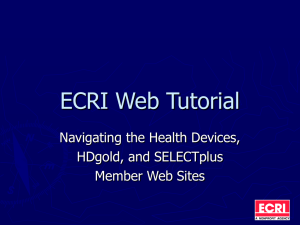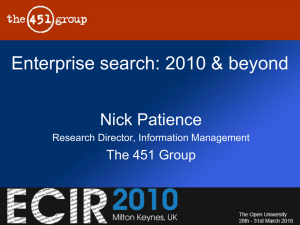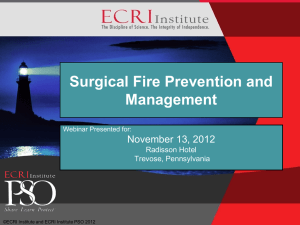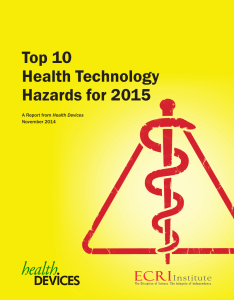OR Integration (infographic white paper)
advertisement
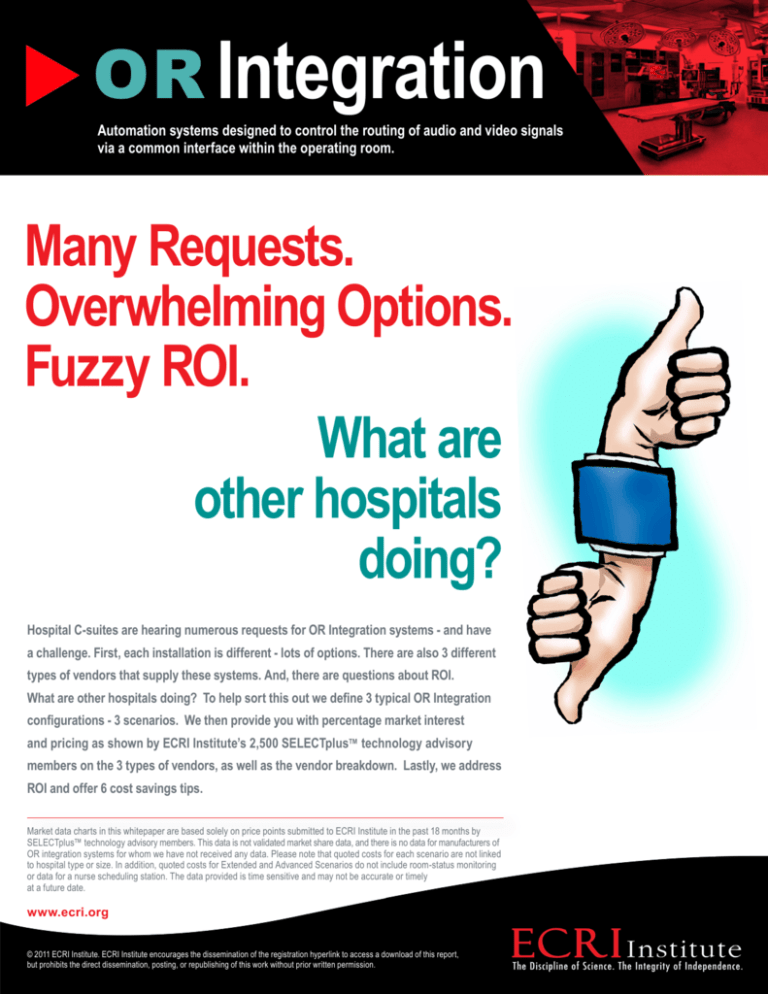
OR Integration Automation systems designed to control the routing of audio and video signals via a common interface within the operating room. Many Requests. Overwhelming Options. Fuzzy ROI. What are other hospitals doing? Hospital C-suites are hearing numerous requests for OR Integration systems - and have a challenge. First, each installation is different - lots of options. There are also 3 different types of vendors that supply these systems. And, there are questions about ROI. What are other hospitals doing? To help sort this out we define 3 typical OR Integration configurations - 3 scenarios. We then provide you with percentage market interest and pricing as shown by ECRI Institute’s 2,500 SELECTplus™ technology advisory members on the 3 types of vendors, as well as the vendor breakdown. Lastly, we address ROI and offer 6 cost savings tips. Market data charts in this whitepaper are based solely on price points submitted to ECRI Institute in the past 18 months by SELECTplus™ technology advisory members. This data is not validated market share data, and there is no data for manufacturers of OR integration systems for whom we have not received any data. Please note that quoted costs for each scenario are not linked to hospital type or size. In addition, quoted costs for Extended and Advanced Scenarios do not include room-status monitoring or data for a nurse scheduling station. The data provided is time sensitive and may not be accurate or timely at a future date. www.ecri.org © 2011 ECRI Institute. ECRI Institute encourages the dissemination of the registration hyperlink to access a download of this report, but prohibits the direct dissemination, posting, or republishing of this work without prior written permission. OR Integration Systems are Customized for Each Installation. Here are 3 Typical Configurations: 1 SCENARIO SCENARIO IN-ROOM 2 SCENARIO EXTENDED Goal: To modernize a general OR EXAMPLE: Route video sources (e.g., endoscopic camera, in-light camera, PACS) to flat panel video displays in the OR. Route audio sources (e.g., mp3 player, microphones) to speakers or recorders in the OR. May offer centralized control of clinical devices such as insufflators and electrosurgical units. 3 ADVANCED Goal: To integrate a specialty OR (e.g., cardiovascular, hybrid, urology) Goal: To build a state of the art integrated OR for educational purposes EXAMPLE: In-room integration plus the ability to route video and audio sources to destinations outside the OR such as conference rooms, doctors’ offices, and scheduling nurse stations. Typically includes teleconferencing, bidirectional communication between ORs, and/or room status monitor. EXAMPLE: All general features of an extended system plus enhanced features such as remote access, IP video networking, room observation, a network hub, or a central media server. Hospitals Purchase Systems from 1 of 3 Types of Vendors: A/V VENDORS 13% A/V VENDORS 14% A/V VENDORS 18% MED/SURG VENDORS 26% MED/SURG VENDORS 14% SURGICAL VIDEO VENDORS 61% MED/SURG VENDORS 20% SURGICAL VIDEO VENDORS 68% SURGICAL VIDEO VENDORS 66% Quoted Price Per Room by Type of Vendor: SURGICAL VIDEO VENDOR Avg. $103,031 HIGH A/V VENDOR Avg. $102,806 HIGH MED/SURG VENDOR Avg. $56,511 HIGH Average Across All Vendors LOW LOW LOW $172,560 $60,534 SURGICAL VIDEO VENDOR Avg. $144,333 HIGH $149,600 $65,965 A/V VENDOR Avg. $136,342 HIGH MED/SURG VENDOR Avg. $139,284 HIGH $81,550 $24,236 $90,867 LOW LOW LOW Average Across All Vendors $191,786 $109,395 SURGICAL VIDEO VENDOR Avg. $230,626 HIGH $167,500 $105,456 A/V VENDOR Avg. $203,316 HIGH $162,502 $125,216 MED/SURG VENDOR Avg. $219,052 HIGH $142,192 LOW LOW LOW Average Across All Vendors $294,816 $195,331 $212,881 $193,752 $228,065 $206,512 $224,670 ECRI Institute Member Interest in the Leading Vendors - by Percentage within in Each Configuration: SURGICAL VIDEO VENDOR Karl Storz Olympus Smith & Nephew Stryker A/V VENDOR Black Diamond Other A/V MED/SURG VENDOR Skytron Steris 24% 2% 2% 33% 36% 18% 4% 10% 32% 7% 7% 20% 9% 4% 4% 14% 7% 7% 6% 20% 100% 4% 10% 100% 7% 13% 100% Other A/V vendors include: Banyan, Image Stream, MedVision, OASYS, and VTS. www.ecri.org © 2011 ECRI Institute. ECRI Institute encourages the dissemination of the registration hyperlink to access a download of this report, but prohibits the direct dissemination, posting, or republishing of this work without prior written permission. WHAT ABOUT ROI? No question OR Integration is a hot topic across the country. This may not only be because there are numerous requests for this capital equipment, but there are also real questions about ReturnOn-Investment. Unlike other capital requests that can come with hard ROI expectations, nobody is making a convincing quantifiable ROI case for OR Integration systems. In a resource-limited environment should your hospital budget for OR Integration? While it may be difficult to quantify ROI, there are benefits. These include: reducing medical errors, attracting or retaining competent OR personnel, improving OR efficiency, and providing new educational tools. Reduced medical errors and near misses can come through improved communications. OR integration systems can also make surgeons, anesthesiologists, nurses, and other OR clinicians “feel more comfortable and more confident that things are going well,” says Warren Sandberg, M.D., Ph.D., formerly associate professor of anesthesia, Harvard Medical School and a program leader of the Operating Room of the Future project at Massachusetts General Hospital. “From a human factors perspective, that is hugely important.” * For those systems with central scheduling monitoring, more efficient use of OR suites can occur. And outside-the-room video can be a useful educational tool. * From “How Could OR Integration Affect Patient Care?” ECRI Institute Trends January 1, 2008 www.ecri.org © 2011 ECRI Institute. ECRI Institute encourages the dissemination of the registration hyperlink to access a download of this report, but prohibits the direct dissemination, posting, or republishing of this work without prior written permission. HOW CAN ECRI Institute HELP? We support you at every stage of your hospital’s technology lifecycle. ECRI Institute Services Lifecycle Total cost of ownership Obsolescence Forecasting Planning Decision to Offer Service That Requires a Technology Technology Use Recalls & alerts Problem reporting Operational & turf issues Interoperability issues Risk/Safety/PSO Corrective maintenance Technology Acquisition COST-SAVING TIPS : Clinical efficacy Forecasting Financial – coding, reimbursement, & ROI Safety Facility requirements Regulatory statutes your wall-mounted 1 Purchase displays from a local video Technology Replacement Hospital Technology Lifecycle 6 OR Integration equipment retailer Decide on Specific Technology to Acquire room-status 2 Keep monitoring separate from OR integration system Market analytics Manufacturer Model Service contract Supplies & peripherals Software Evaluations Buy/lease/ fee-for-service Pricing Negotiation RFP development Proposal assessment Fit with need Future options Maintenance use the integration 3 Don’t system to control room lighting use the integration 4 Don’t system to control surgical lighting either use the integration 5 Don’t system to control use the 6 Don’t integration system for HVAC audio communications Whether you’d like to find out more about the data described in this white paper, or you need tools to help you meet your technology challenges, our experts can help. For more information contact Jennifer Myers, jmyers@ecri.org, or call us at 610-825-6000, ext. 5287 ECRI Institute is designated an Evidence-based Practice Center by the U.S. Agency for Healthcare Research and Quality, and is listed as a federally certified Patient Safety Organization by the U.S. Department of Health and Human Services ECRI Institute is a 43 year old independent, nonprofit organization that researches the best approaches to improving safety, quality and cost-effectiveness of patient care. www.ecri.org © 2011 ECRI Institute. ECRI Institute encourages the dissemination of the registration hyperlink to access a download of this report, but prohibits the direct dissemination, posting, or republishing of this work without prior written permission.

